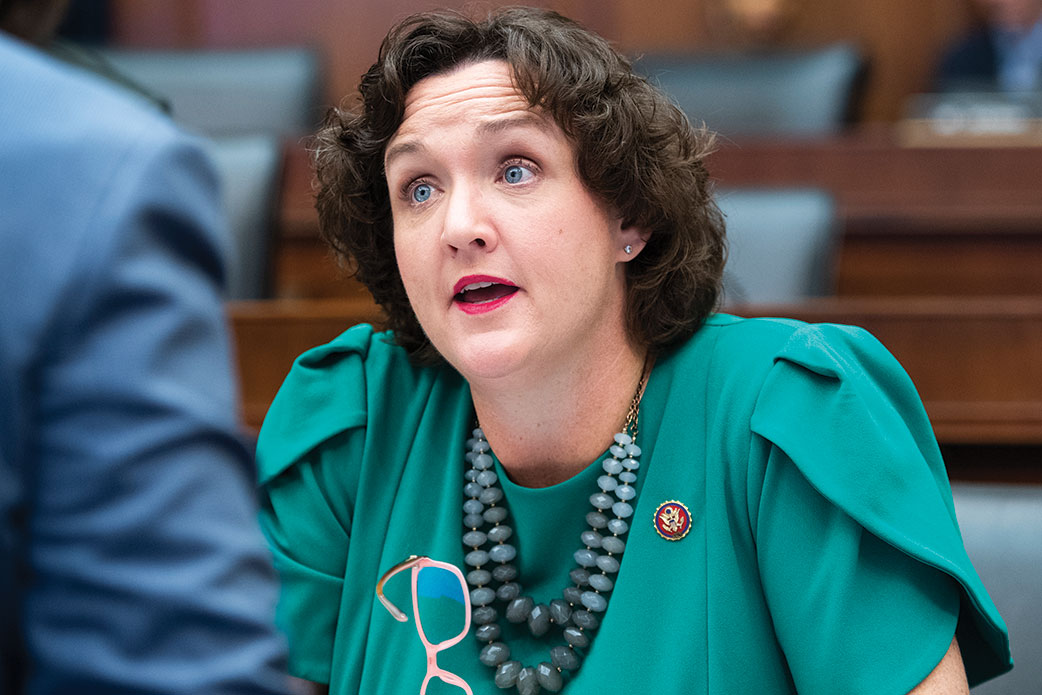Irvine, Calif.—Representative Katie Porter, a single mother of three children 8 to 14 years old, hopes for the day when no one asks her or anyone else, “How do you do it?”
Porter is the first single mother in Congress raising young children. Her most significant opponent today may be the calendar. The morning we met, her flight back to DC was canceled. And she has to coordinate her congressional schedule with school breaks, parent-teacher conferences, scout meetings, guitar lessons, and more.
To make it easier for more single parents to serve as congressional representatives and to encourage more people to run for office whose life experiences reflect those of the people they represent, Porter has proposed potentially game-changing legislation that could transform the face of Congress. The Help America Run Act, which passed the House in October with bipartisan support and was introduced in the Senate the same month, would allow working parents running for office to use campaign funds for health insurance premiums and child, elder, or dependent care while campaigning. The use of campaign money for child care was a gray area until 2018, when the Federal Election Commission ruled that a congressional candidate could use funds in such a way while she was running. Additionally, Porter is working with colleagues to make the congressional calendar more family-friendly by lessening the time members spend commuting between DC and their home districts and increasing the time spent with constituents and family.
Despite the record gains by female candidates in the 2018 midterm elections, women make up just 24 percent of Congress—still far below their 51 percent of the US population, according to the Pew Research Center. “Even with this progress, we’re not even at half,” Porter said. “Until we change some of the structures of the institution in the same way that we see private employers change some of the structures of work, we’re not going to see fast progress.”
In the past year, Porter, 46, has emerged as an independent and influential voice in Congress. She was one of the first Democrats who flipped a Republican district in November 2018 to call for Donald Trump’s impeachment. Her forceful questioning during congressional testimony—of bank CEOs like Jamie Dimon of JPMorgan Chase, whom she pushed on pay disparity; Secretary of Housing and Urban Development Ben Carson, who thought Porter was asking about Oreo cookies when she used the term “REO” (or “real estate owned” in property parlance); and Facebook CEO Mark Zuckerberg, whom she grilled about user privacy practices and labor conditions for contractors who monitor the most gruesome content on the platform—has highlighted her skill in asking hard-hitting questions that go viral. A Harvard Law School graduate, Porter taught consumer bankruptcy and mortgage foreclosure law at the University of California, Irvine, School of Law before entering Congress.
Popular
"swipe left below to view more authors"Swipe →
And she’s been a pack leader for 70 Cub Scouts—a role that requires a keen knack for scheduling. “I made our calendar for 2020 in August,” she said.
About 60 women gathered shortly after 7 am on an early November day at Porter’s old Irvine stomping ground for a breakfast of the Orange County chapter of the nonpartisan National Association of Women Business Owners. The attendees, some of whom lean Republican, cheered and applauded her like a rock star when she spoke about the rising costs of child and health care. “The fact that she’s an everyday woman, she’s a working mom—that gives me a lot of confidence as a woman that she understands and she cares,” said Ailene Dewar, a small-business consultant who was there. Dewar registered as a Democrat last year after more than 30 years as a Republican because of the GOP’s support for Trump and his impact on the public discourse. “She’s so good at framing the conversation so that it is a good bipartisan conversation,” Dewar added. At the breakfast, Porter also stressed the need for affordable housing and talked about the harmful consequences for working families of capping the annual federal deduction for state and local taxes at $10,000. She wants to repeal the limit, which took effect in 2018 as part of Trump’s tax bill.
Porter is the first Democrat to win a House seat in California’s 45th Congressional District since its creation in 1983. Located about 40 miles southeast of Los Angeles and including part of Orange County, the district is a mix of business parks, universities, technology firms, freeways, and unexpected patches of bucolic woods and farms. The population is 62 percent white, 25 percent Asian, and less than 2 percent black; 20 percent identify as Hispanic. The median household income is more than $100,000 a year.
While other lawmakers sent surrogates, Porter was the only member of the region’s congressional delegation to attend the breakfast herself, said Katie Adams Farrell, the president of the association’s Orange County chapter. Other local and state officials spoke, but Porter was clearly the event’s headliner. “It’s inspiring to see a woman who is standing up for what she believes in,” Adams Farrell said. “She’s absolutely a role model.”
Porter drew what may have been the loudest applause at the breakfast when she spoke about her proposed Family Savings for Kids and Seniors Act, which would more than double the pretax amount that families can set aside for child and elder care in flexible spending accounts, from $5,000 to over $11,000. The figure has not changed since the Reagan era.
Representative Jaime Herrera Beutler, a Republican from Washington state, is cosponsoring the bill. “The skyrocketing cost of child care is a crisis for families in Southwest Washington, and across the country,” she said in an e-mail. “Caring for a child or an aging parent costs a significant amount of money, and can be a heavy load for working families to carry.”
Herrera Beutler, who gave birth to her third child last year, praised Porter’s Help America Run Act. “It’s important Congress continues to have a diverse perspective at the table influencing policy,” she said. “Congress should make it easier for more mothers of young children to run for office, and the Help America Run Act is one way to do that.”
Not surprisingly, Porter shares sensibilities about the financial challenges facing working families with her law school mentor Elizabeth Warren, whom Porter has endorsed for president. Porter said she remembers visiting Warren when one of Porter’s children needed a diaper change. Warren quickly volunteered that she had spare diapers. “Elizabeth was really there for me as I tried to juggle being a mom and working,” Porter said. “She’s been there—she’s been a working parent.”
Porter’s road to Congress involved starting her day at 5 am to make fundraising calls to the East Coast for the campaign, getting her kids to school by 8:30 am, and lots of coordinating with different nannies as she juggled family, campaign events, and work as a law professor. “I had multiple people. I had someone for the morning. I had someone for the afternoon,” she said. “With the campaign, it’s the odd hours. It’s a combination of long hours, an uncertain schedule, the intensity, the travel.”
Her experience and that of Liuba Grechen Shirley, who ran for Congress from New York in 2018, inspired Porter to craft the Help America Run Act so future candidates with young children would know more clearly how they can use campaign funds. Grechen Shirley appealed to the Federal Election Commission when she realized taking her children, then ages 1 and 3, along for the full-time job of campaigning wouldn’t work and that the cost of child care was too high for her family. The issue had not come up since 1995, when Representative Jim McCrery, a Republican who represented Louisiana’s Fifth District, said he needed his wife, who cared for their son, on the campaign trail. He asked the FEC if he could use campaign funds to pay for child care when his wife campaigned for him. He prevailed with the commission and in his reelection bid. Without urging from Grechen Shirley, former presidential candidate Hillary Clinton wrote a letter supporting her effort. The FEC ruled in Grechen Shirley’s favor, making it permissible for candidates for federal office to use campaign funds for child care during campaign activity.
Grechen Shirley lost the race for Representative Peter King’s seat, but she soon founded Vote Mama, a political action committee to help support Democratic women with children under 18 as they ran for office, from school boards to the US Senate. “We’re missing out on the voices of people who understand the issues that most Americans are living with,” she said. “I just think it’s important to normalize what it looks like for a mom to run. We need to change who has a seat at the table.”
King recently announced he will not seek reelection. Though Grechen Shirley said she won’t run to succeed him because she’s expecting her third child (due two months before the primaries), she plans to continue her work with Vote Mama to make it easier for mothers and pregnant women to run.
Since the ruling, some states—including Utah, New York, and California—have passed laws supporting the use of campaign funds for child care. Porter’s bill, if enacted, will codify the FEC ruling and expand it to cover elder and dependent care and health care premiums.
“There were colleagues of mine who went without health insurance while they were candidates,” Porter said. Once in Congress, she had to wait nearly a month before congressional health insurance could take effect for her family. “The response was to go on my husband’s health insurance,” she said. “Well, I don’t have a husband.” Porter, who is divorced, timed her last day at UC Irvine so she could keep her health insurance from the university for her children and herself during that period.
The proposed legislation could help attract more women, particularly working mothers, to run for office, said Frances Rosenbluth, a professor of political science at Yale University. “It’s a step in the right direction.” Her research has not found that voters discriminate against female candidates; in fact, voters say they feel positively toward candidates who are mothers. But they also want representatives who can put in long hours to get the job done and gain seniority, and few women want to run under these conditions, she said. “It’s just very hard to balance the expectations that women are wives and mothers with the demands of an American-style legislative run and career,” Rosenbluth continued. Women candidates “are up against something that male candidates don’t have to think about.”
But once a woman with children gets elected to Congress, the unpredictability of the schedule can be almost as big an obstacle. A 12-hour day is a good one—they’re often longer. Congress meets throughout the year to vote on legislation, and lawmakers have to be ready for the unexpected, like last year’s government shutdown, which required members to travel repeatedly back to Washington for votes to fund the government, or the recent House impeachment hearings. Porter commutes 19 hours round trip for her visits with constituents and her duties in DC. Her children and their nanny moved to Washington with her last fall, but they have since moved back to Irvine. After the move to DC, Porter said, “I’m trying it. I’m doing what families do.” The cancellation of her flight that morning, this time due to bad weather in Chicago, was a familiar frustration. “I’ve had to do this so many times,” Porter said. It’s been hard, she added, but she’s determined to make both running for and serving in Congress more family-friendly.
“We should have the freedom and the flexibility to allow members of Congress to make the child care and living arrangements that let them best do this job,” she said.




